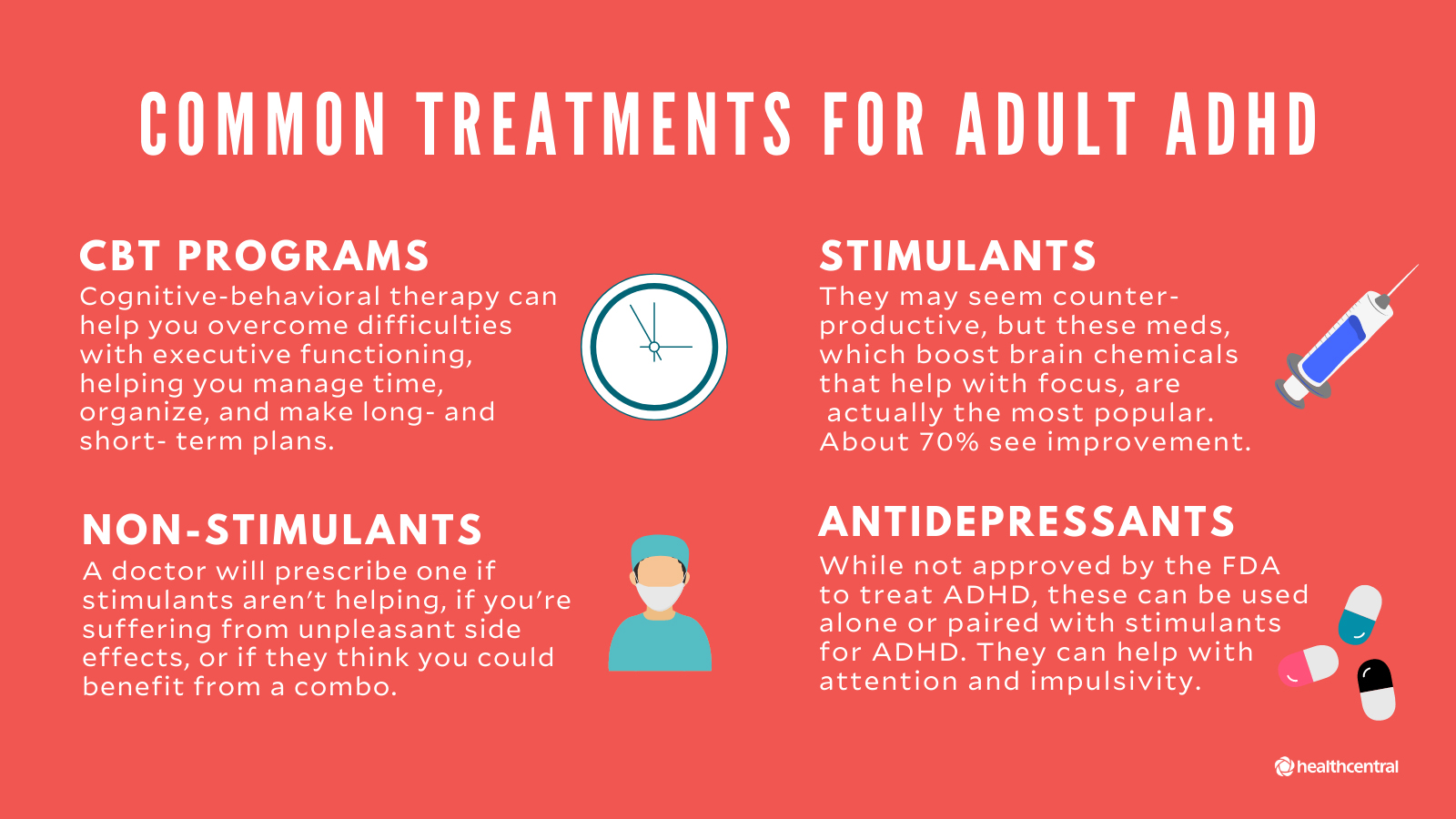Exploring Effective ADHD Treatment Choices for All Ages
The complexities of Focus Shortage Hyperactivity Condition (ADHD) present special obstacles throughout various age teams, demanding a thorough expedition of effective therapy options. A combination of behavior modifications, pharmacological interventions, and way of living adjustments has actually revealed promise in addressing the varied requirements of individuals with ADHD. However, the efficiency of these methods can vary significantly based upon individual circumstances, increasing critical questions about tailored strategies. As we take a look at the range of treatment methods readily available, it ends up being important to think about not just their instant impacts yet also their lasting ramifications for individuals and families.
Comprehending ADHD and Its Influence
Attention-Deficit/Hyperactivity Disorder (ADHD) is a neurodevelopmental condition defined by consistent patterns of inattention, attention deficit disorder, and impulsivity that can substantially impact various aspects of an individual's life. It typically materializes in childhood years, although signs can continue into adulthood. The core signs and symptoms of ADHD can disrupt instructional performance, hinder social communications, and complicate work ventures.
People with ADHD frequently have problem with preserving concentrate on tasks, organizing tasks, and following via on directions, which can cause academic underachievement (Depression Treatment). In social contexts, impulsivity might result in problems in creating and maintaining relationships, as people may disrupt conversations or make hasty decisions without thinking about repercussions
Furthermore, ADHD can co-occur with various other psychological health conditions, such as stress and anxiety and anxiety, further making complex medical diagnosis and therapy. The variability in symptom presentation means that ADHD can influence individuals in different ways, necessitating a tailored approach to administration. Comprehending ADHD's multifaceted effect is important for creating effective methods that sustain individuals in navigating day-to-day difficulties and achieving their potential. Comprehensive understanding of ADHD's nature and ramifications lays the groundwork for exploring ideal treatment choices customized to every individual's needs.
Behavioral Therapies for ADHD
Countless behavior therapies have been established to efficiently address the obstacles related to ADHD, focusing on customizing details habits and cultivating crucial skills. Amongst the most identified techniques are cognitive-behavioral therapy (CBT), parent training, and social skills training.
CBT helps people identify and transform adverse thought patterns and habits, advertising a much more favorable expectation and enhanced self-regulation. This therapy commonly includes functional techniques for managing impulsivity and enhancing company. Moms and dad training programs empower caretakers by equipping them with methods to reinforce favorable habits and set regular limits, which can be specifically useful for kids with ADHD.
Social skills training is another important part, teaching individuals with ADHD just how to connect successfully with peers - Depression Treatment. This strategy typically involves role-playing and comments to enhance interaction, collaboration, and dispute resolution skills
Incorporating these behavior modifications into a thorough therapy strategy can dramatically enhance operating and quality of life for people with ADHD. Inevitably, the effectiveness of these treatments relies on tailored methods that consider the special requirements of everyone, therefore promoting durability and versatility in day-to-day life.
Drug Options Available
For many people with ADHD, drug can play a substantial role in handling symptoms and improving general functioning. Both key groups of drugs recommended for ADHD are energizers i was reading this and non-stimulants.
Energizers, such as methylphenidate and amphetamine-based medications, are the most typically used therapies. These medicines work by boosting the degrees of neurotransmitters, specifically dopamine and norepinephrine, in the brain, which helps improve interest and reduce impulsivity and hyperactivity. They usually yield quick outcomes, making them a preferred choice for many people.

It is essential for doctor to perform a comprehensive assessment to identify one of the most proper medicine based upon individual needs, medical history, and prospective adverse effects. Regular follow-up and surveillance are likewise vital to make sure the effectiveness of the selected treatment and to make any type of necessary changes.
Lifestyle Modifications to Consider
Handling ADHD properly expands beyond medicine, as way of life adjustments can dramatically enhance overall health and symptom control. Including structured routines is important; constant schedules help people with ADHD handle their time efficiently and reduce feelings of bewilder.
Normal physical task is another important part. Exercise not just aids to enhance concentration but additionally increases mood and lowers anxiety levels. Tasks such as yoga or group sports can be especially useful, promoting both physical conditioning and social interaction.
Nourishment likewise plays a critical duty. Depression Treatment. A well balanced diet regimen rich in omega-3 fatty acids, entire grains, and lean proteins can add to enhanced emphasis and cognitive function. Restricting sugar and processed foods is advisable, as these can aggravate hyperactivity and impulsivity
Rest More hints health is important for handling ADHD signs and symptoms. Establishing a regular rest timetable and creating a relaxing setting can boost sleep high quality, bring about much better focus and emotional regulation.
Alternate and All Natural Approaches
Alternative and alternative approaches to ADHD therapy supply a diverse series of choices that match standard approaches. These approaches often focus on way of life adjustments, nutritional treatments, and restorative methods that intend to improve total well-being while dealing with ADHD symptoms.

Mindfulness and behavioral therapies are additionally obtaining traction as all natural interventions. Practices such as yoga exercise, reflection, and cognitive-behavioral therapy can cultivate self-regulation and enhance attention. These approaches support psychological strength, which is specifically useful for people with ADHD.
Herbal supplements, such as ginkgo biloba and ginseng, are occasionally explored; nevertheless, it is vital to consult healthcare professionals before incorporating these right into treatment plans. While alternative and holistic approaches can offer important support, they should preferably be made use of combined with evidence-based therapies to accomplish ideal results for managing ADHD across every ages.
Verdict
In summary, efficient ADHD therapy requires a comprehensive strategy that includes behavioral therapies, medication, way article source of life modifications, and alternative approaches. This multifaceted method underscores the significance of individualized care in attending to the varied needs of people with ADHD throughout all age groups.